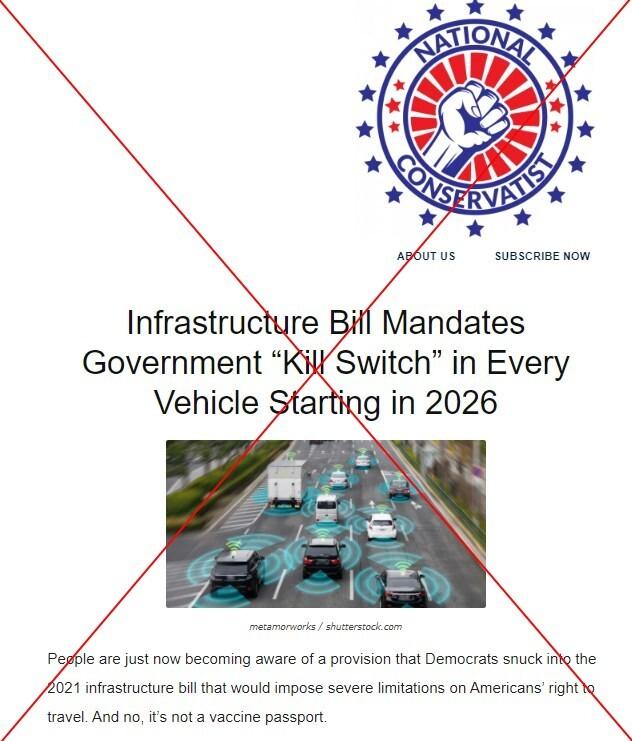
Posts mislead on US infrastructure law, vehicle 'kill switch'
"The bill mandates that all new cars sold starting in 2026 must have a 'kill switch' installed that the government and law enforcement has control over," says an article from the National Conservatist. "Want to go on vacation this summer? Sorry, you've expressed naughty thoughts on social media that Joe Biden doesn't approve of. No car for you."
Similar posts spread on Instagram, Facebook and Gab in early 2023. A narrator in a TikTok video said the legislation is "part of a governmental war on freedom of movement," and a Facebook user claimed "big brother will monitor your driving speed and direction."

The posts come after a Texas lawmaker in late 2022 proposed legislation to ban kill switch devices in cars sold in the state.
"The idea that the federal government or an international mega-corporation would have the ability to decide when, where and if private citizens can operate their own personal vehicles is not only preposterous, but it is deeply antithetical to the principals of a free country," said Bryan Slaton, a Republican state representative, in a December 19, 2022 Facebook post.
The social media posts specifically mention the bipartisan infrastructure law that President Joe Biden signed in November 2021. The $1.2 trillion package will fix bridges and roads, change out unhealthy lead water pipes, build an electric vehicle charging network, and expand broadband internet.
But the Infrastructure Investment and Jobs Act has no provision for a vehicle kill switch -- other independent fact-checking organizations addressed similar claims in 2022.
What the law does call for: "advanced drunk and impaired driving prevention technology" based on rules developed by the National Highway Traffic Safety Administration (NHTSA), part of the Department of Transportation. Such technology could automatically shut off cars operated by drivers with blood alcohol levels above the legal limit.
"Congress didn't mandate any specific technology in the legislation, and there is no automotive technology that exists or in development that could be considered a 'kill switch,'" said Rob Strassburger, president and CEO of the Automotive Coalition for Traffic Safety (ACTS), an industry group working with the federal government to identify solutions for automakers.
"Nothing in the infrastructure bill gives any law enforcement or third party access to any information on vehicles or control of any technology installed in vehicles."
A spokesperson for the partnership, known as the Driver Alcohol Detection System For Safety (DADSS), said technologies are still in development. But the most promising are breath detection or a touch-based system known as tissue spectroscopy to measure blood alcohol.
In either case, the spokesperson said, the system would be a "closed loop." That means data would not be shared outside the vehicle -- including with law enforcement.
Researchers have studied similar technology over the years, and some automakers have added such systems on a voluntary basis to curb alcohol-related traffic fatalities.
"This is technology under development, but the original idea back in 2008 was and is a closed loop," said Jeffrey Michael, a former NHTSA official and current faculty member at the Johns Hopkins Center for Injury Research and Policy who has studied such systems for more than a decade. "It is internal, it is prevention technology -- not enforcement technology."
Michael, who chairs a technical working group aimed at implementing the congressional mandate, added that the system "is not aimed at communicating with anyone."
AFP has fact-checked other false and misleading claims about the Infrastructure Investment and Jobs Act here and here.
Copyright © AFP 2017-2026. Any commercial use of this content requires a subscription. Click here to find out more.
Is there content that you would like AFP to fact-check? Get in touch.
Contact us




